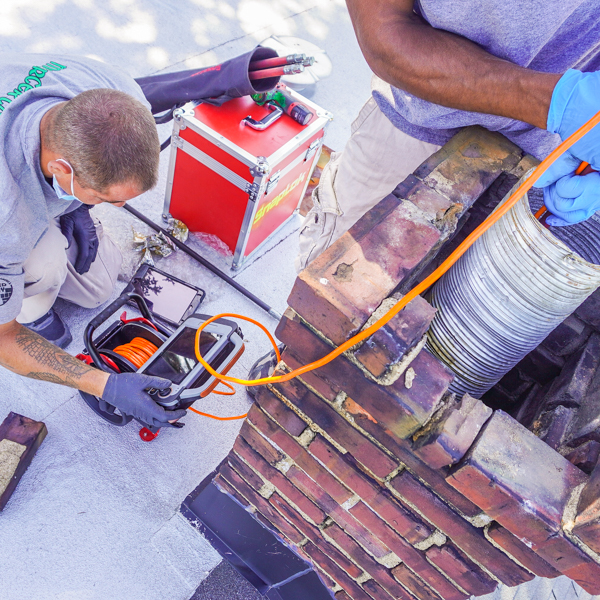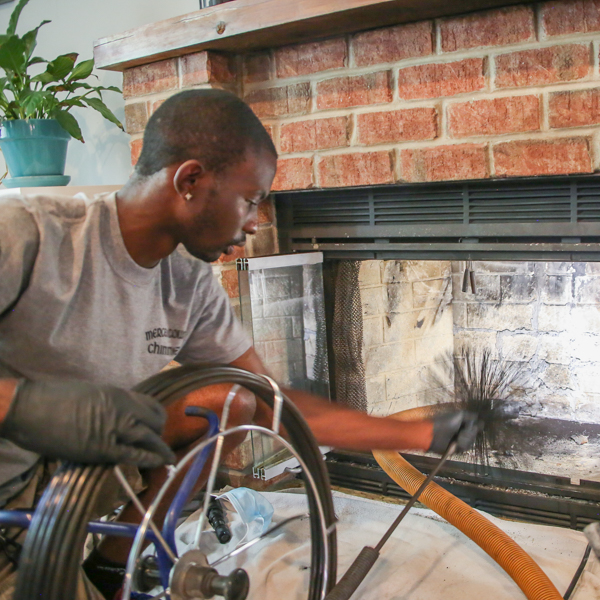Can I prevent creosote buildup?
As homeowners in Mercer County are getting ready to light the fireplace for the winter season, many are unaware of a hidden danger. It’s called creosote. Creosote is a natural substance created during the combustion of wood and other fuels. The problem with creosote is that it continues to buildup layer upon layer with every burn. If you don’t remove creosote with chimney cleaning each year, it will harden into what is known as stage 3 glazed creosote – a dark tar-like substance that is very flammable. Every winter, fire departments in New Jersey and around the country respond to thousands of house fires with creosote buildup often cited as the primary cause, according to National Fire Protection Association (NFPA) statistics. While you can’t prevent creosote buildup entirely, there are several things you can do to minimize its accumulation, so it doesn’t become a fire hazard.
 Inspect Your Chimney Annually
Inspect Your Chimney Annually
Hiring a chimney sweep to perform annual chimney inspections is the most effective way to prevent creosote buildup. According to the Chimney Safety Institute of America (CSIA), an 1/8” layer or more of creosote is hazardous and should be removed. However, due to the narrow passageways in chimneys, it is often difficult to know the extent of the buildup without a thorough inspection. The chimney inspection will also reveal any deficiencies such as masonry damage, water leaks, obstructions, draft problems, and other issues that can contribute to creosote buildup and reduce the safety and efficiency of the chimney and fireplace.
Burn Seasoned Hardwood
In addition to annual chimney inspections, only burning hardwoods that have been seasoned or dried for at least six months is the next best thing you can do to minimize creosote buildup. It burns hotter and cleaner, providing a longer-lasting fire with less creosote. On the other hand, fresh or green wood has a significant moisture content (over 60%). Wood with high moisture content burns faster at much lower temperatures resulting in incomplete combustion that produces smokier fires with more creosote. You will also need to keep adding wood fuel to maintain the fire producing even more creosote.
Remove Excess Ash
Depending on how often you use the fireplace during the winter, you may need to remove excess ash accumulating in the firebox periodically. That’s because the moisture and acidic compounds in the ash can damage the grate and interior masonry. So, it’s a good idea to remove excess ash when it is piling up in the grate. However, leaving a thin one-inch layer on the firebox floor will help start and maintain a fire that will burn hotter and minimize creosote buildup.
Don’t Use Accelerants to Light the Fireplace
You should never use lighter fluid or any other accelerant to light an indoor fireplace. They are highly flammable and contain volatile organic compounds that will produce toxic fumes. In addition, to creating excessive creosote, flammable liquids can cause extreme heat that damages the flue liner and interior masonry. It can also lead to an uncontrollable chimney fire or explosion, resulting in significant property damage, injury, and even death.
Consider Installing a Fireplace Insert
Wood-burning and gas fireplace inserts increase the heating efficiency of a traditional masonry fireplace producing more heat with significantly less pollution and creosote. They fit directly inside the opening of an existing fireplace and are easier to clean and maintain. Many homeowners install inserts to convert a wood-burning fireplace into a gas fireplace and vice-versa.
 Chimney Maintenance and Cleaning
Chimney Maintenance and Cleaning
During annual chimney inspections and cleaning, a professional chimney sweep will remove creosote buildup and ensure your chimney and fireplace are safe to operate. If you haven’t had your yearly chimney inspection and cleaning yet, contact the certified chimney professionals at Mercer County Services to schedule an appointment today. Our licensed and insured technicians keep fireplace owners safe and warm throughout the Hamilton and Mercer County, NJ, communities.


